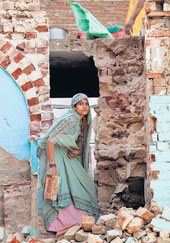 |
| Their sense of fear of police, rowdy elements, their feeling of helplessness, are still the same. A Telegraph file picture |
The setting-up of the state women’s commission in Jharkhand was the fulfilment of a long-cherished desire of the people, especially the women of the state, to have an authoritative yet sympathetic forum for listening to and addressing grievances exclusively for women.
The Bill, pertaining to the establishment of the commission, was passed by the Jharkhand Vidhan Sabha, thereby making it an Act in 2005. Subsequently, vide notification number 1221 dated September 16, 2006, of the social welfare, women and child development department, Jharkhand, the first chairperson (that is, myself) and two members (Louis Marandi and Meera Jayaswal) were appointed. All of whom have joined, and set the ball rolling.
The Act, however, provides for five non-government members, three nominated government members and a chairperson. The chairperson, five NGO members and member secretary, have to be women. The term for chairperson and members is three years.
The state women’s commission has been entrusted with varied responsibilities, which include hearing complaints and arranging for their redressals, studying all enactments concerned with women and their rights and giving creative suggestions, visiting jails and other detention centres or shelter homes and monitoring their improvement, seeing that the different government schemes for women, especially regarding social welfare, health, education, labour, among others, are properly implemented.
Coordinating with the government authorities and non-government organisations for starting various projects for the welfare of women, all come under the responsibilities given to the commission. It is, therefore, a very interesting scenario for the commission, full of challenges on the road ahead. The Domestic Violence Act, 2005, will hopefully provide a better deal with women, and will come in handy to all women commissions throughout India and help them deal more swiftly to cases related to protection of women at home, a subject which hitherto had never surfaced fully to get statutory recognition in the country. The setting up of the Jharkhand state women’s commission is definitely a step in the right direction. Ever since, it has seen a steady stream of complainants coming in. They belong to different streams and strata of the Jharkhand society, but their complaints all tell stories of suffering, anguish and deprivation of basic rights.
Their sense of fear of the police, fear of rowdy elements, their feeling of helplessness, are all the same. Most of the cases pertain to dowry and domestic violence, while some relate to sexual harassment at the work place. The state women’s commission has started reaching out to these women, despite its still negligible financial and logistical support.
In certain cases, as soon as the respondents get notices from the commission, they become anxious for compromise. No doubt, this is too early a stage to assess the impact of the work of the state women’s commission, but if the increasing number of complaints is any indicator, one can conclude that the setting up of the commission was a necessity long overdue.
The commission, functioning from A/432 Ashok Nagar, road number 5 (near telephone exchange), Ranchi (Telephone — 2241298), is open to such grievances, with no fees charged for filing of charges. Complaints can be filed in Hindi, English or Bengali, through post or personally. After hearing both the parties the commission passes an appropriate order, in shortest time possible. For the wait for justice has been too long already.
Laxmi Singh is the chairperson of Jharkhand state women’s commission.










